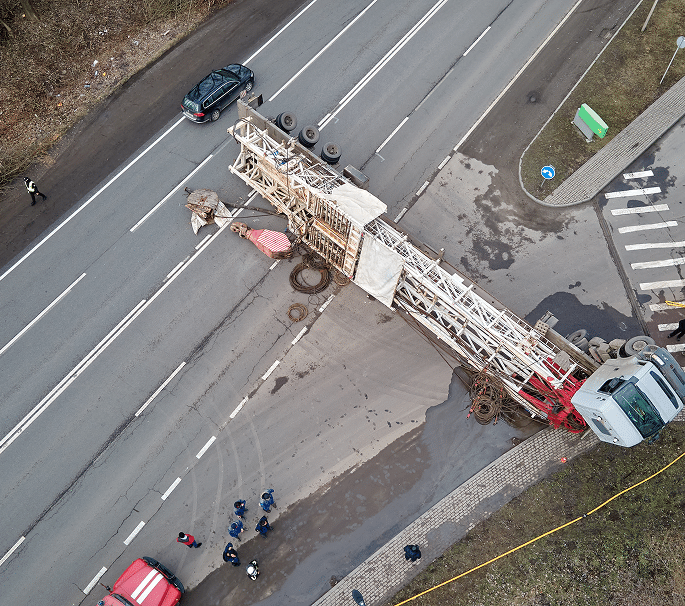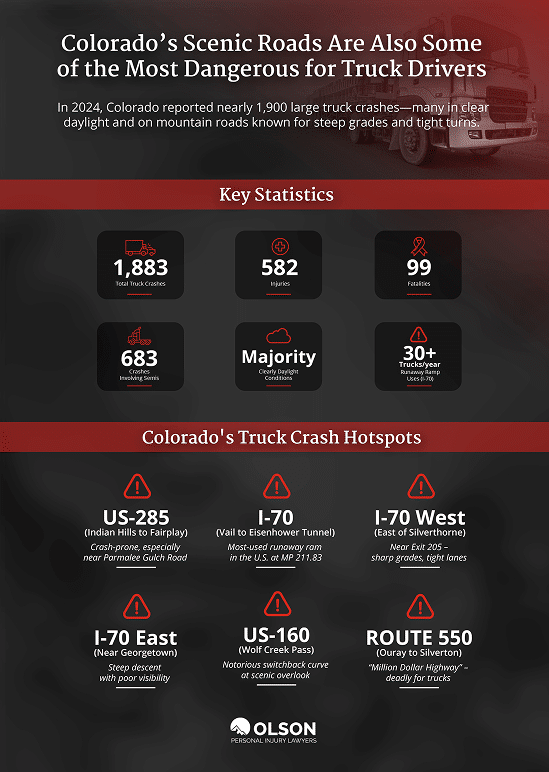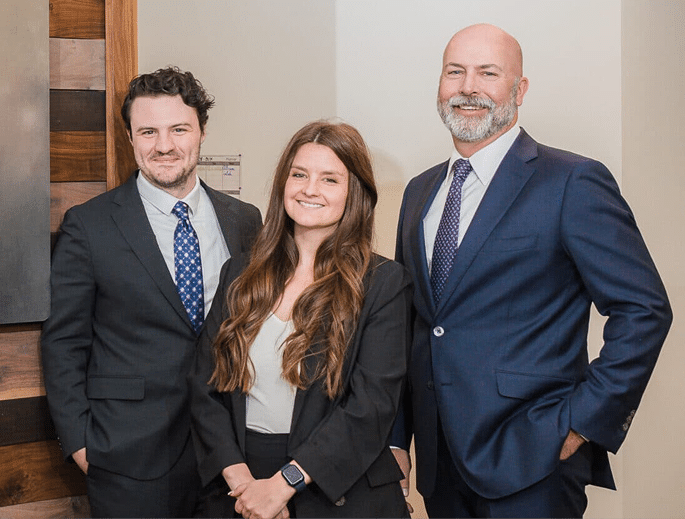Colorado Truck Accident Lawyer
Our truck accident lawyers proudly serve clients across Colorado. We are committed to making a difference in our clients’ lives with relentless advocacy, compassionate care, and proven courtroom strength. We focus on helping them recover and get back on track after a devastating accident.

- Zero Fee
- No Win, No Fee Pledge
- 30-Day Guarantee
- Try Before You Commit
- We Come To You
- Convenience at Your Doorstep
We’re here to help
Commercial truck accidents are more likely than other traffic accidents to cause catastrophic injuries due to the massive size and weight of trucks. Colorado truck accident cases are typically more complex than other car accident claims because numerous state and federal laws govern the trucking industry, and multiple parties share responsibility for trucking safety. You will need a skilled Colorado truck accident lawyer on your side to level the playing field.
Our experienced truck accident attorneys at Olson Personal Injury Lawyers have recovered millions on behalf of injured truck accident victims and grieving families. We know how the trucking industry operates and can help you recover substantial compensation if you or your loved one has been injured in a truck accident. Contact us through our contact form today or call (720) 796-9939 to schedule a free consultation.
Why Choose Olson Personal Injury Lawyers For Your Truck Accident Claim?
We are an experienced Colorado truck accident law firm dedicated to providing an unwavering customer experience with outstanding results. We treat each case with the same fervor and commitment as if it were our own. When you trust us with your truck accident injury claim, we take that trust seriously and see you not as a case but as a person. You can count on us to be there for you when you need us, even after you receive your settlement. We work on a contingency fee basis, meaning you don’t pay a dime unless we win your case.
We also understand that results matter. We have a 99.6 percent success rate and over 300 five-star Google reviews.

Truck Accident Settlements We’ve Secured For Our Colorado Clients
$2,000,000
Client’s child sustained severe injuries after being ejected from a car that was sideswiped by a commercial truck in Denver, CO.
$1,000,000
Our client, a truck driver, was involved in a crash after his trailer overturned on the side of I-80. While other drivers noticed the accident and safely shifted over to avoid the right lane, the driver of an 18-wheeler, distracted and not paying attention, failed to see the warning signs and collided with our client
$919,000
Client suffered from catastrophic injuries, including 13 broken ribs, a severe neck injury that required a fusion, and a broken shoulder, when a distracted truck driver struck them on I-80 near Rawlins, Wyoming.
$500,000
Client secured a substantial settlement after being injured in a truck accident caused by a commercial driver’s negligence in Wyoming.
$425,000
Client obtained fair compensation for medical expenses and lost wages after being injured in a truck accident.
$400,000
Client obtained fair compensation for harm caused by a truck accident resulting from unsafe driving practices.
$350,000
Client was driving a delivery truck when he was hit by an off-duty police officer who was driving in the wrong direction, leading to a broken femur and ongoing knee and foot pain, in Denver, CO.
Confidential
Client was rear-ended by a bus after pulling to the side of the road during a snowstorm in Denver, CO.
Why Our Clients Trust Us With Their Colorado Truck Accident Claims
Our clients trust us with their truck accident claims because we consistently deliver compassionate, personalized service and outstanding results. Hear directly from those we’ve helped as they share their experiences and why they chose Olson Personal Injury Lawyers to fight for their justice.

I was involved in a life altering 18-wheeler accident. I called The Olson Law Firm and they immediately took my case. They handled my case with care and professionalism. I highly recommend Sean Olson and his team. We were able to secure the maximum payout policy limits. Even though my case is now settled, Sean and I have become good friends”
- Michael Fitch
Everyone was so comforting from the initial encounter to the very end of the process. They treated me more like a friend than a client. Calling them was one of the best decisions I ever made”.
- Linda Arosa
“Olson Personal Injury Lawyers was professional, compassionate, and incredibly knowledgeable throughout my entire case. They fought hard and secured a settlement that exceeded my expectations”
- Francis Senyah
“After my accident I contacted Olson Law Firm and explained what had happened. I had never been in this kind of situation, so I was unsure what steps to take. The folks at Olson walked me through the process and agreed to take my case. Working with Olson Law Firm has been great! They have kept me informed at every step of the process. The communication is hands down the most impressive part of my experience. I hope I’m never in a situation like this again, but if that were to happen, I wouldn’t hesitate to hire them again”.
- Joshua Pierce
Our Truck Accident Videos
Our attorneys have extensive experience handling truck accident cases, and we’ve captured some valuable insights in the following videos. Watch as they discuss the complexities of truck accident claims and how Olson Personal Injury Lawyers can help you navigate the legal process to get the justice and compensation you deserve.
Areas Served in Colorado
No matter where your accident happened, we are here for you. Our truck accident attorneys are proud to serve residents across Colorado, including:
- Denver
- Colorado Springs
- Aurora
- Fort Collins
- Golden
- Thornton
- Arvada
- Westminister
- Pueblo
- Greeley
- Boulder
- Breckenridge
Areas Served in Colorado


Who Is Liable for Truck Accidents in Colorado?

Multiple parties play a role in truck safety, and any or all of them may be liable when you are injured in a truck accident, including the following:
- Truck drivers: accidents caused by speeding, distracted driving, violating hours-of-service rules, drunk driving, and failing to follow all other traffic jobs
- Trucking companies: negligence of drivers or their own negligence, such as negligent hiring, unrealistic delivery schedules, hours-of-service violations, poor truck maintenance, and inadequate driver training
- Cargo loading companies: improperly tying down a load or loading it unevenly
- Maintenance contractors: negligent inspections or repairs
- Trucking manufacturers: defective truck parts, such as brakes and tires
- Government entities: failure to maintain roads, poor lighting, lack of signage, and slow or inadequate snow and ice removal
We will look closely at the role of every party connected to the truck and hold each negligent party accountable so you receive the compensation you deserve.
Holding Trucking Companies Responsible
Holding trucking companies responsible for driver negligence is not straightforward. If the driver is an employee, holding the trucking company responsible is easier because of vicarious liability. However, some drivers are independent contractors. In these cases, vicarious liability may still apply if the company owns the truck.
Even if vicarious liability is off the table, this does not mean you cannot hold the company liable. Our experienced truck accident lawyers will conduct a deep investigation to identify the trucking company’s negligence. We will look at post-trip inspection records, maintenance records, the company’s hiring practices, training protocols, and all relevant information related to the safety of the truck and the driver.
Why Are Colorado Truck Accident Claims More Complex Than Other Motor Vehicle Accidents?
Truck accident claims are more complex than other motor vehicle accident claims for the following reasons:
- Trucking companies are wealthy. They use their wealth to hire expensive attorneys who blame innocent accident victims for their injuries, push lowball settlements, and pressure them to make recorded statements so they can undermine their claims.
- Multiple parties are responsible. Many parties, such as cargo loaders and trucking companies, are responsible for truck safety, which would not be involved in other car accident claims.
- Trucking regulations can affect liability. Truck drivers and trucking companies must follow regulations specific to trucking. A knowledgeable lawyer must know these laws and identify and connect violations to the accident.
We have the knowledge and experience to navigate these complex issues and prove your case. It is crucial to preserve whatever evidence you can after your accident, such as photographs and eyewitness contact information, and to involve an experienced attorney like Sean Olson as soon as possible.

Proving Your Colorado Truck Accident Claim
The trucking company’s lawyers will try to poke holes in your case from the beginning. You will need strong evidence, including the following:
- Forensic evidence, such as black box data and an accident reconstructionist’s analysis of the scene
- Photographs of the skid marks, wrecked vehicles, and your injuries
- Video footage of the accident and its aftermath
- Eyewitness statements
- Safety and recall history for your vehicle and the truck
- The police report
- Your medical records to prove how severely you are injured and that the injuries did not preexist your accident
It is crucial to gather this information as soon as possible after your accident because it may only be available for a short time. For example, skid marks may fade, wrecked vehicles may be destroyed, and eyewitnesses may forget details.
You may not be able to obtain this evidence on your own. The trucking company will perform its own investigation, but it probably won’t release all of its findings to you. Even getting your medical records can be challenging. We have systems in place to obtain all the evidence you will need to get the best results available.
Compensation for Truck Accident Injuries in Colorado
Economic Damages
Economic damages are compensation for the financial costs of the accident and include the following:
- Medical expenses — doctor visits, rehabilitation, physical therapy, hospital stays, imaging tests, laboratory testing, prescription medications, medical devices, transportation to the doctor, and future costs
- Incidental costs — personal care, housekeeping, and other domestic tasks you cannot perform for yourself
- Lost wages — hourly wages, salary, benefits, and loss of future earning capacity
- Property damage — vehicle repair or replacement costs, and the value of personal property damaged during the accident
The amount you receive for economic damages will be based on the amount you can prove with documentation, such as medical bills. We can help you gather the necessary documentation and collaborate with life care planners, medical experts, and financial analysts to prove your future lifetime costs.
Non-Economic Damages
Non-economic damages are compensation for subjective losses related to your quality of life, such as the following:
- Pain and suffering
- Loss of enjoyment of life
- Emotional distress
- Loss of bodily functions
- Inconvenience
- Loss of society
- Loss of consortium
While some states allow accident victims to receive unlimited non-economic damages, Section 13-21-102.5 of the Colorado Revised Statutes limits non-economic damages to $1.5 million. This limit is adjusted annually. Its purpose is to protect big businesses from exceptionally large verdicts, known as nuclear verdicts, which often exceed $10 million.
We are committed to helping you recover the maximum amount available. When calculating non-economic damages, we consider the severity of your injuries, the degree of your pain and suffering, whether your injuries are permanent, and other factors unique to you.
Punitive Damages
Punitive damages, also known as exemplary damages, are awarded in rare cases when you can prove the defendant committed fraud or acted with malice or willful and wanton conduct. Punitive damages are also known as non-compensatory damages because their purpose is to punish the defendant. State law generally limits punitive damages to an amount equal to your total economic and non-economic damages, although there are limited exceptions.
When a Loved One Dies in a Truck Accident in Colorado
You may be entitled to economic, non-economic, and punitive damages when a truck accident causes a loved one’s death. Economic and non-economic damages in a truck accident claim may include the following:
- Funeral and burial expenses
- Your loved one’s medical expenses
- Your loved one’s probable lifetime income had they lived
- Loss of companionship
- Grief and mental suffering
- Loss of parental guidance
Non-economic damages in wrongful death claims in Colorado have higher limits than claims involving surviving victims, which are adjusted annually. The 2025 limit is $2,125,000. This is in addition to any economic and punitive damages awarded.

Colorado Truck Accident Statistics
The landscape features that make Colorado beautiful also make it a hotspot for truck accidents. According to the Motor Carrier Management Information System, Colorado was the site of 1,883 large truck crashes in 2024, which injured 582 people and killed 99. Of these, 683 involved semis. Although accidents occur during adverse weather conditions, most occur on clear days during daylight hours in dry conditions. Accidents at night were more common in poorly lit areas. The most dangerous areas are in the mountains and include the following:
- US-285 from Foxton Road to Fairplay, particularly leading to Indian Hills/Parmalee Gulch Road
- I-70 between Vail and the Eisenhower Tunnel, where more than 30 semi trucks use runaway ramps every year. According to the Colorado Department of Transportation, the Lower Straight Creek runaway ramp at Milepost 211.83 is the most heavily used in the United States.
- Interstate 70 West, just east of Silverthorne near exit 205
- Interstate 70 East near Georgetown
- US-160 along Wolf Creek Pass, especially the switchback curve at the scenic overlook
- Route 550, especially the section between Ouray and Silverton, also known as the Million Dollar Highway, is one of the most dangerous truck routes in the United States.
How Our Colorado Truck Accident Lawyers Can Help
With Olson Personal Injury Lawyers on your side, you can focus on rest, recovery, and your family while we take care of your legalities. Every case is personal to us, and we will do the following with the same degree of passion as if you were our family:
- Investigate the accident by visiting the site and collaborating with accident reconstructionists and forensic analysts
- Gather evidence, including forensic data, video surveillance, vehicle safety history, and eyewitness statements
- Review your medical history and collaborate with medical and vocational experts to calculate the lifetime costs of your injuries
- Negotiate with insurance companies and refuse to accept less than you deserve
- File your lawsuit on time, prepare your case as if it will go to trial, and take it to trial if the responsible parties fail to pay full compensation
- Advise you of your rights, answer your questions, and provide compassionate support throughout your case and beyond
We will devote our own time and resources to get you the best results possible. Our 30-day guarantee allows you to terminate your agreement without penalty if you are dissatisfied with our service. If you continue with us, you pay nothing unless we win.

Colorado Truck Accidents FAQs
- How Long Do I Have To File a Truck Accident Claim in Colorado?
The statute of limitations for filing a truck accident claim is generally three years from the date of the accident. However, if the accident resulted in a fatality, a wrongful death claim must typically be filed within two years of the victim’s death.
If a government entity is liable, you have 182 days to file a Notice of Claim, and you must wait an additional 90 days before filing your lawsuit. You generally must file your lawsuit within two years of the date of the incident.
It is important to contact an attorney as early as possible, rather than wait for the statute of limitations to approach. Your attorney will need time to investigate and prepare your case, and the most important evidence may only be available for a short time.
- What Safety Regulations Do Truck Drivers Have To Follow in Colorado?
Colorado truck drivers must follow multiple safety regulations, including the following:
- Weight limits — Semi trucks must weigh 80,000 pounds or less on national highways and 85,000 pounds or less on state highways. The Federal Highway Administration uses the federal bridge formula to calculate weight limits for various truck sizes.
- Size limits — The maximum truck length is 45 feet for single-unit trucks and 70 feet for tractor-trailer combinations. The maximum width is 85 feet, and the maximum height for national highways in Colorado is 14.5 feet.
- Hours-of-service limitations — Federal law limits truck drivers to 11 hours of drive time per day, a 14-hour maximum shift, and a minimum 10-hour off-duty period. Short-haul drivers are exempt from the 11-hour rule but must follow the 14-hour limit.
- Post-Trip Inspections — Commercial drivers must inspect their trucks after each shift, and trucking companies must repair deficiencies or take vehicles out of service.
- Tire Chain Law—Most drivers of 16,000-pound or heavier vehicles must carry tire chains on designated highways from September 1 to May 31 and install them when the Colorado Department of Transportation activates the requirements.
We can identify safety violations and hold trucking companies accountable for the resulting injuries.
- What Causes Most Truck Accidents in Colorado?
The most common causes of truck accidents in Colorado include the following:
- Brake failures, especially on steep mountain roads
- Speeding or failing to adjust to the conditions
- Distracted truck driving
- Drunk truck driving
- Improperly loaded cargo, which could cause a trailer to overturn
- Drivers continuing to drive in high winds, especially with empty cargo trailers
- Driver fatigue, often due to long shifts or hours-of-service violations
- Defective tires
- Snowy and icy roads
Regardless of the most apparent cause of your truck accident, our attorneys will look beneath the surface to uncover all of the contributing factors so we can hold every negligent party accountable.
- What Injuries Are Common in Truck Accidents?
Truck accidents may result in catastrophic injuries that cause chronic pain, permanent disabilities, and a reduced quality of life. These injuries may include the following:
- Traumatic brain injuries
- Spinal cord injuries
- Paralysis
- Crushing injuries
- Broken bones
- Severe burns
- Amputations
- Death
We understand the toll severe injuries can take on you and your family, and we are here to provide emotional support and fight for justice when the unthinkable happens to you or your family.
Don’t Let a Truck Accident Define You - Contact Us For a Free Evaluation
We are an award-winning personal injury law firm in Colorado that provides unrivaled representation in and outside courtrooms throughout Colorado. We bring convenience to your doorstep and meet with you at the time and place of your choosing, including your home, hospital bed, or a Zoom virtual meeting.
If you or your loved one is injured in a truck accident anywhere in the state, we’ve got your back. Involving us early will help us preserve important evidence and ensure your case is filed on time. With our Zero Fee guarantee and a 99.6 percent success rate, you have nothing to lose by choosing our Colorado personal injury lawyers. Contact us online today or call us to schedule your free case evaluation.







